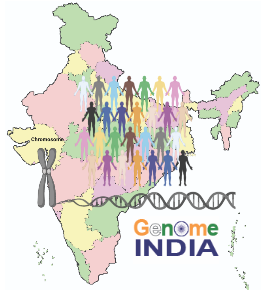GenomeIndia: Cataloguing the genetic variations in Indians
Human genome mapping studies have shown that there are substantial differences in genomes of the populations across the world. The most commonly represented Caucasian genome diverged from the Indian population over 30-50 thousand years ago. Furthermore, unlike homogeneous Caucasian populations, the Indian population is very heterogeneous with over 4,500 genetically distinct subpopulations. The aim of the ‘GenomeIndia: Cataloguing the Genetic Variation in Indians’ project is to do whole genome sequencing (WGS) for 10,000 healthy individuals of the country’s diverse populace. This project will generate a unique dataset which will catalogue the unique variations of representative population groups across the country to create a catalogue of genomic variants for Indians.
The project will help in cataloguing the common as well as low-frequency genetic variations in the Indian population, along with a comprehensive understanding of the copy number variations specific to our population and thus facilitate future large-scale genome-wide association studies for researchers across India. This project is jointly run with Initiative for Biological Systems Engineering (IBSE) and Robert Bosch Center for Data Science and AI (RBCDSAI).

Current research projects
Systems biology of yeast
To understand genotype-phenotype maps in populations and in evolution of genetic networks
Take me thereGARBH-Ini
Developing models for gestational age estimation and preterm classification and risk prediction in Indian populations
Take me thereGenomeIndia: Cataloguing the genetic variations in Indians
The project aims to carryout whole genome sequencing of 10,000 Indians representing the genetic diversity of the Indian population
Take me thereIndo-European Consortium for Next Generation Influenza Vaccine INCENTIVE
Data analytics for development of next generation influenza vaccines for the EU and India
Take me thereMetaSUB Chennai
Analysis of post-COVID19 environmental metagenome of Chennai City Metro
Take me thereComputational biology
Reanalysis yeast genomic, transcriptomic, proteomic, metabolomic, and phenotype datasets to search exciting questions to gain novel insights
Take me there